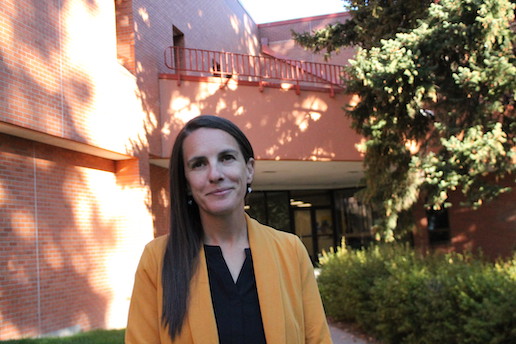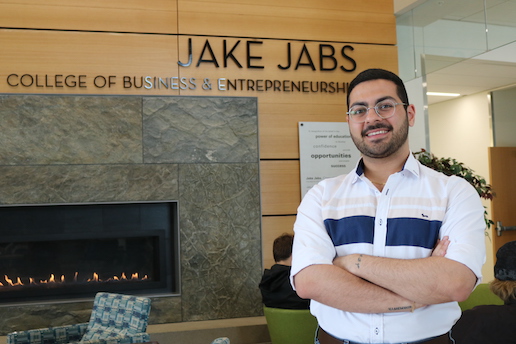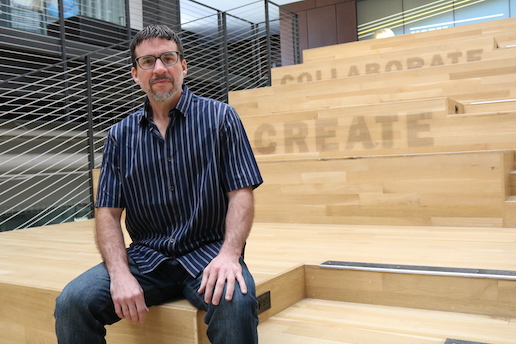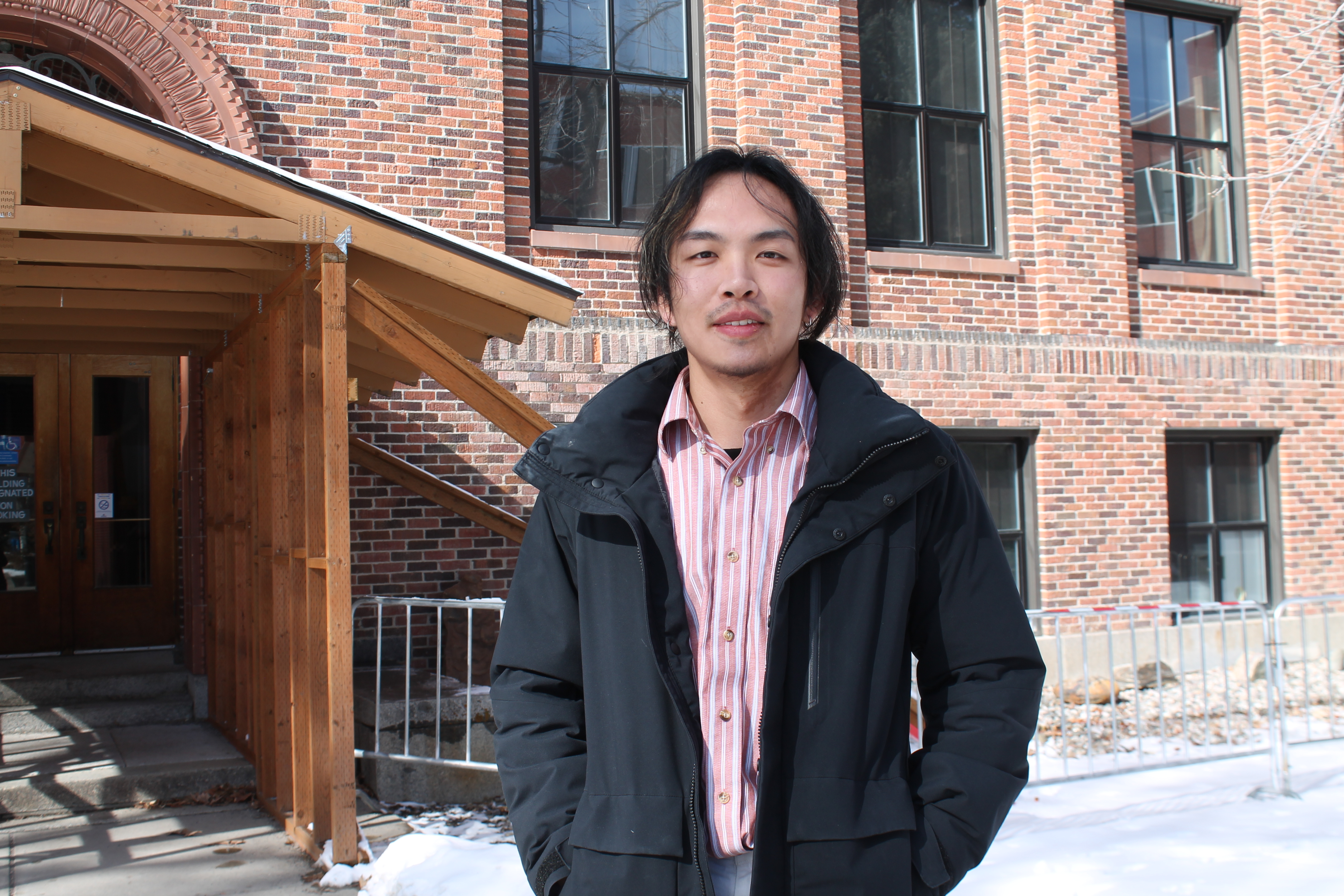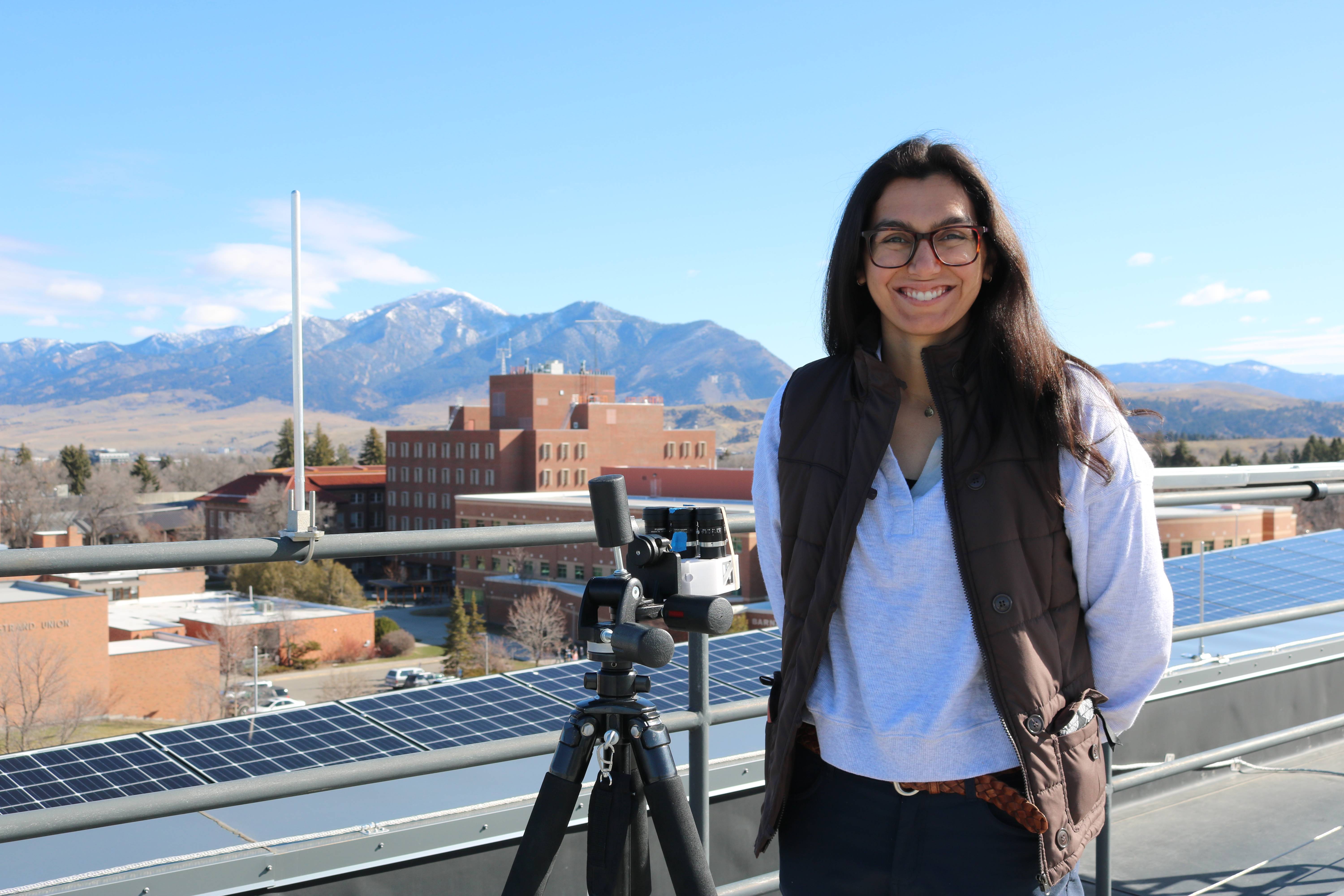Graduate Student Success Stories
|
Giorgio MoralesPh.D Computer Science |
 |
|
|
Giorgio Morales, MS in computer science from MSU and Ph.D. student in the same program, is a Peruvian graduate student. Having gotten a BS in mechatronic engineering, he changed his academic path to computer science when working as a researcher at a national university in Peru.
“Although I had majored in mechatronic engineering, my job made me feel more inclined toward programming, machine learning, and artificial intelligence, so I decided that is what I wanted to do. However, I was stuck at some point because I felt the need to expand my knowledge in this field that was new to me. That is when I decided to pursue graduate studies in computer science abroad,” he commented.
With his new interests clear and his participation in precision agriculture and environmental monitoring projects back in Peru, he started to consider research a purpose-driven career.
“I liked the idea that my research had a beneficial impact on society, so I started looking for universities working on similar research projects. Then I found that MSU, surrounded by natural marvels and technified agriculture, is suitable for this type of research. More importantly, I found really interesting ongoing research projects carried out by the School of Computing, the Optical Technology Center, and the College of Agriculture,” said Morales.
Even if he faced some challenges at the beginning, like taking graduate-level courses in a different area from his undergraduate major, he got the faculty’s support to feel confident and grateful to the professionals who guided him through this process. Giorgio Morales started the program as a Teaching Assistant and soon became a Research Assistant, a job that led him to write four conference papers and two journal papers and make the most of his program.
He is now fully working on an important national multidisciplinary precision agriculture project and has been helping with some classes in the Gianforte School of Computing, as well as enhancing his knowledge about Computer Science and participating in some community-related events.
“Life as a graduate student has many different opportunities. There are several graduate seminars you can attend and be part of; I consider that a wonderful opportunity to connect with your peers on an academic level. There are also cultural and social activities that help you to balance life and connect with other people from diverse backgrounds, which is always a learning opportunity,” pointed out.
Giorgio also recommended some advice for incoming and prospective grad students: “I would recommend asking as many questions as possible. You will find that there are a lot of opportunities on campus that can help you in many ways. You can find people that can give you advice on academic issues, organizations that care about your mental health, food scholarships, recreation activities, people that help international students, and much more.”
Tracy Gatlin
Master's in Public Administration
“Stick with it, meet with professors when you’re feeling lost in the content; MSU wants to see you succeed! Use the University resources. Also, apply for fellowships and grants, they are out there, and the Office of Research Development has resources to help graduate students.”
Tracy Gatlin, born and raised in Montana, is a current graduate student. Besides her studies in the Master’s in Public Administration program, she is a full-time employee of the Office of Research Development at MSU and a mom of two wonderful kids. After earning her bachelor's degree in Elementary Education, and getting diverse job experiences, Tracy decided to get more involved with the research field.
“My student teaching was difficult and after graduation finding a local teaching job came with fierce competition. I eventually found employment elsewhere and made my way through a variety of jobs to Seattle then Boston without any real career direction. In Boston, I wound up working as an administrative assistant in a collaborative laboratory building housing researchers from multiple Harvard teaching hospitals,” she commented.
After working within the Division of infectious Diseases at Massachusetts General Hospital, Gatlin came back to Montana to raise her first child and to start a position at MSU in 2019. The desire for a better position and especially because of the new worldwide challenges, Tracy Gatlin started to think about an advanced degree more seriously. Moreover, she considered the benefits she would get as an MSU full-time employee.
“I have been always connected with MSU, from great grandparents, parents, and my own undergraduate degree. As a full-time employee my tuition is fully waived, which makes the opportunity much more accessible,” Tracy expressed.
Facing some challenges like time management, stress, and the gap between her bachelor’s, she has gotten a name in her program and among her peers as being an in-career graduate student. Gatlin commented that she has reduced those difficulties by prioritizing, applying for and being awarded with the child care scholarship MSU provides, and by frequently visiting the Writing Center to feel more confident and comfortable.
Being a grad student demands time and focus, but she finds ways to participate in some activities around campus and the Bozeman community. “If I can make time, I try to attend things like the welcome picnic. Our family is a host family through the friends of international students' program established this year in OIP, so we include another PhD student in our family activities as much as possible.”
Finally, she left a message for our future Bobcats. “Stick with it, meet with professors when you’re feeling lost in the content; MSU wants to see you succeed! Use the University resources. Also, apply for fellowships and grants, they are out there, and the Office of Research Development has resources to help graduate students,” Tracy recommended.
Olivia Andrus
Master's in Science & Natural History Filmmaking
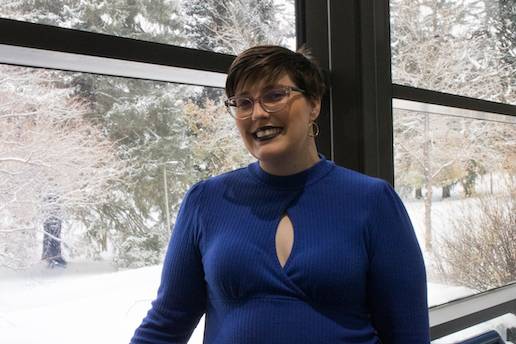
“This program supported me as I reached for the stars to create my thesis film. I was able film dolphins in Australia and work with two major environmental non-profits based within the US and Australia during the pandemic. The lessons from this program allowed me to successfully crowdfund my thesis film and write grants that helped me get to Australia. One grant that I applied for and received was the Professional Travel Grant provided by MSU to graduate students who need help financing the costs of travel for different graduate work.”
Olivia Andrus, a graduate student in the Science and Natural History Filmmaking Program and the owner of Big Sky Genesis Productions, LLC, developed her thesis film in Australia filming dolphins and working with two major environmental non-profits. She is the Student Assistant MFA Coordinator, a position that allows her to be involved in other MSU departments and groups to, as she expressed, “organize several events and create a better program for the next generation of graduate students.”
After graduating from Purdue University in Wildlife Biology and Film/Video Studies and having worked in environmental education trying to get into the wildlife filmmaking industry, Olivia started to investigate different programs to keep her goals on track.
“I chose the Science and Natural History Filmmaking Program at MSU because it had a 98% placement after graduation into the industry, the alumni were very successful in all aspects of the film industry, and I felt comforted by the experience level the faculty had who were leading the program,” she explained. Andrus also expressed her appealing about professors considering students as colleagues and the mix of academic backgrounds among classmates.
“I also found it interesting that this program was made for scientists to be the best science communicators through the medium of film. This means that everyone in my cohort came from completely different backgrounds. This created such a unique experience because we were all learning together but able to challenge each other since we had different views of the world,” Olivia mentioned.
She also commented on the funding challenges she saw when considering applying to the program, but once she started, the program’s faculty and staff taught students about how to write grants, do crowdfunding and create their own business. She also got a research assistantship within the department, which provided her with financial stability.
“This program supported me as I reached for the stars to create my thesis film. I was able film dolphins in Australia and work with two major environmental non-profits based within the US and Australia during the pandemic. The lessons from this program allowed me to successfully crowdfund my thesis film and write grants that helped me get to Australia. One grant that I applied for and received was the Professional Travel Grant provided by MSU to graduate students who need help financing the costs of travel for different graduate work,” she affirmed.
Olivia is also the College of Arts and Architecture's steward for the graduate student union, where she serves as the spokesperson for debates about stipends, graduate teaching assistantship positions, and other concerns that the students have while attending graduate school at MSU.
Regarding recommendations for prospective graduate students, Olivia Andrus suggested to facilitate and engage in conversation with the graduate coordinators, program directors and current students. Besides, she also encouraged openness to the graduate experience and to ask as many questions as possible to clarify any doubt.
“If you want certain things out of this program, it has to come from you. Don't expect the professors to hold your hand and walk you through how to be a filmmaker. You have to have the drive, the time management, and the determination to make it in this program and this field. The professors can only mentor you so far, so if you want something get involved with the program and fight for it.”
Finally, do not forget the fun of it! “It goes by so fast, but the bonds you make last forever. I still call upon my cohort members for honest feedback on my films or just to talk. My cohort members are family to me and that was the best part of this whole program for me,” the passionate-in-filmmaking grad student said.
Stephanann Costello
PhD in Biochemistry
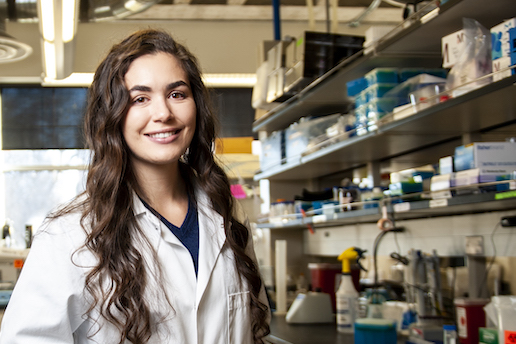
“When I visited the Chemistry and Biochemistry department during the graduate recruiting weekend, I fell in love withit.There was a distinct feeling of support engrained, and the graduate students seemed genuinely happy. There was a clear picture that the department was doing everything they could to help the students succeed. I also met my current advisor and felt like her mentorship style and her research was an environment I could really thrive in.”
After getting her undergraduate degree in Chemistry with a focus in Biochemistry, it felt like a natural path to gain “freedom to do integral research” and the possibility to teach through joining the Graduate School. Stephanann Costello, PhD Candidate in Biochemistry at Montana State University, explained what elements influenced her to make that decision.
“When I visited the Chemistry and Biochemistry department during the graduate recruiting weekend, I fell in love with it. There was a distinct feeling of support engrained, and the graduate students seemed genuinely happy. There was a clear picture that the department was doing everything they could to help the students succeed. I also met my current advisor and felt like her mentorship style and her research was an environment I could really thrive in,” commented.
For her, it was such authentic care for student success that allowed her to overcome different challenges, like the imposter syndrome that many students experience at some point of their journeys.
“Multiple factors helped me overcome it, but a wonderful support system, an advisor (and committee) who believed in me, challenged me but also celebrated my work, and my personal dedication to hard work overtime were the primary ways. A few others include fellow lab-mates. We have a great team environment that my advisor has cultivated,” Stephanann affirmed.
On the other hand, she also explained the importance of a continuous professional training, among conferences and courses, to share input and obtain greater experiences, like the American Indian Science and Engineering Society (AISES) conference, the Summer Program in Neuroscience Excellence and Success (SPINES) course, the MSU Graduate Leadership Academy (GLA).
Costello is a busy and enthusiastic graduate student, who has been a Graduate Teaching Assistant for general chemistry lab courses and, currently, she does full time research as a Graduate Research Assistant. She also mentioned other activities she has participated in:
“Various conferences (AISES, Metabolomics Association of North America - MANA, Metabolomics, Society for Neuroscience (SFN), courses (SPINES in Woods Hole MA), and MSU courses (GLA, and a mentorship workshop for REU students). I am both an INBRE NAG fellow, and Alfred P. Sloan Indigenouse Graduate Partnership (SIGP) scholar, and with SIGP have had the opportunity to participate in outreach events for recruiting prospective Native American graduate students. I have also mentored various undergraduate students, an REU student and rotating graduate students in Dr. Copié's lab.”
It was not difficult for her to share some of the key ideas she learned during her program. “Trust and embrace the process. Nothing can truly prepare you for graduate school and everyone's journey is unique. This is such a distinctly different and wonderful time in your life that gets to be fully dedicated to learning. In the midst of the incredibly demanding work it takes, also enjoy Graduate school for what it is and take full advantage of all the wonderful opportunities that arise,” she concluded.
Vinicius Alves Cruz
Ph.D. Animal and Range Science
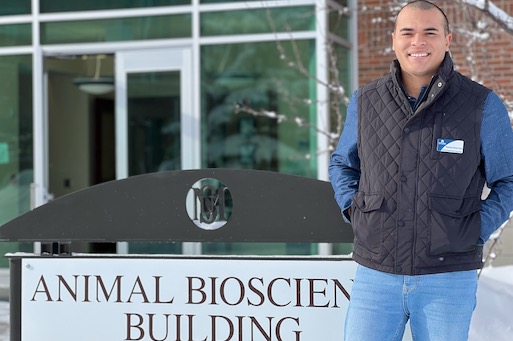
“I felt welcome right away. As an international student, you always feel a little frightened about the beginning of the semester, like how you will handle the graduate level courses in a different country. However, every faculty at the department of Animal and Range Sciences was very supportive and always willing to help even outside of office hours. It definitely helps to boost your confidence throughout your academic journey.”
“To be honest, I didn’t expect to be so immersed in my program,” said Vinicius Alves, Ph.D. student in the Animal and Range Sciences department. He commented on some difficulties he thought he would face as an incoming international graduate student from Brazil, “I had two weeks to prepare my PowerPoint slides to teach in two nutrition labs in my very first semester, and also started a trial with 90 recently weaned calves, aside from taking graduate level courses for the first time in an American university. I felt overwhelmed at the beginning.”
However, Vinicius pointed out that he tried his best and that’s how in the two years he’s been in the program, he had found a balance and confidence in his capabilities. “I’ve had more than 100 students in all labs and activities so far and I’ve participated actively in more than 4 research trials with some of the most important animal nutrition companies worldwide such as Chr. Hansen and Nutreco,” affirmed.
Vinicius previously studied equine nutrition and management (North Dakota State University) and beef cattle nutrition and management (University of California - Davis) as an exchange student thanks to a national scholarship from Capes-Brazil he awarded in his undergraduate studies. Besides, back in Brazil, he gained experience as a teaching assistant and research assistant.
“I also started teaching as an undergraduate teaching assistant in two undergrad nutrition courses at my University (Bs in Animal Sciences - UFRRJ-Brazil), where afterwards I got my master's degree in Animal Science. Now as a Ph.D. student in Animal and Range Sciences, these previous experiences provided me with the right tools to succeed in my graduate program, where I had the opportunity to start my program as a graduate teaching assistant, and subsequently, as a graduate research assistant,” stated Alves.
Student success also depends on the methodology faculty and staff use to make students feel welcome and connected with the program. Vinicius Alves mentioned how the experience was for him, “I felt welcome right away. As an international student, you always feel a little frightened about the beginning of the semester, like how you will handle the graduate level courses in a different country. However, every faculty at the department of Animal and Range Sciences was very supportive and always willing to help even outside of office hours. It definitely helps to boost your confidence throughout your academic journey.”
Besides the carefully selected teaching materials and the frequent research advice for increased efficiency Vinicius received from faculty, he also shared that the Office of International Programs and the Department of Animal & Range Sciences’ events have positively impacted on his college life to develop a sense of belonging and networking.
On a separate note, Alves mentioned some of the resources available at MSU he used the most, “I do think that MSU is a really inclusive campus where everyone is welcome. Due to my field of study, I have several hands-on opportunities at the MSU research farms, having access to machinery (tractors, ATV, skid-steers), analytical labs, and of course the animals. Providing me everything I need to conduct high quality research.”
He finished suggesting to always reach out to your peers and faculty if having concerns. “It’ll make your life easier.”
Katrina Lyon
Ph.D. Microbiology & Immunology
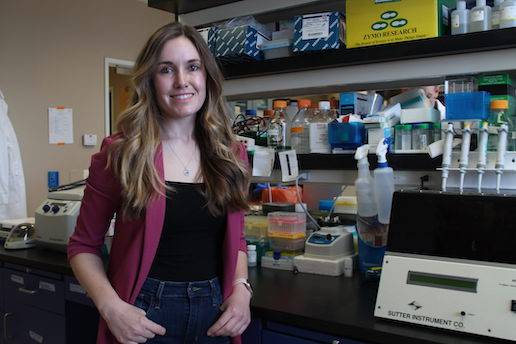
“The Microbiology & Cell Biology department is incredibly flexible with our programs of study. The department values individuals’ career development over what is written in the handbook. I have been allowed to substitute and/or add classes such as BioMEMS: The Art of Tissue Chips and Research & Methods in Engineering to support my multidisciplinary work.”
“College was really tough. STEM subjects never came naturally to me, and I had to work very hard to just have a basic understanding,” confessed Katrina Lyon, a Microbiology graduate student who is also a continually active leader on campus. Even though her undergraduate college experience was challenging, to say the least, she stuck to her desire to join the STEM field, first as a biologist.
“I purchased my first textbook on Performing Arts Medicine, and this interest blossomed into a much broader passion for medicine as a whole. The first in my family to pursue a college education, I enrolled at MSU on the pre-med track,” commented Lyon. For a series of reasons, including financial hardship, Katrina dropped the idea of going to med school; nonetheless, she found another interest.
“It wasn’t until I read a paper on organoids and was pushed into trying research (thanks Dr. Aga Apple) that I found new passion and purpose. I am brought to life by organoid technology–these "mini organs" are not only patient-specific disease models for individualized therapeutic development, but also have the potential to completely transform transplantation medicine,” stated.
Katrina also highlighted some aspects of her passions by expressing that she dedicates herself 110% to what she believes has a strong impact. “I am so excited to be pursuing a degree that will allow me to enhance human health and hopefully treat disease. I am particularly passionate about cancer–tackling such a global burden takes a village, and my time as a researcher has inspired me to join the interdisciplinary network of dedicated scientists across the globe working toward the same goals.”
Graduate School requires a high level of time commitment and self-advocacy; thus, she shared how now she’s become more independent. Furthermore, Katrina also affirmed that having a good balance among your activities is key for success, “I am currently working on prioritization and delegation of tasks.”
In that regard, the Microbiology & Cell Biology department gave her the flexibility she needs for learn and thrive while also having time for other student organization-related commitments.
“The Microbiology & Cell Biology department is incredibly flexible with our programs of study. The department values individuals’ career development over what is written in the handbook. I have been allowed to substitute and/or add classes such as BioMEMS: The Art of Tissue Chips and Research & Methods in Engineering to support my multidisciplinary work,” Lyon mentioned.
Katrina has had a inspiring academic journey, and despite her initial doubts about doing research due to a lack of a “perfect” GPA, she had the mentorship and support from some MSU faculty, such as Dr. Diane Bimczok, who believed in her since the beginning and offered her a position in her lab.
“For the last 5 years, the Bimczok lab has provided me with a supportive environment where I feel valued as both a scientist and human being. I couldn’t have asked for a better research team to work with,” she pointed out. Besides, she also thinks bonding with fellow graduate students helped her to feel more welcome.
She is one of the leaders of MSU WISE, serves the First Generation and MCD Diversity committees, and participates in the Graduate Leadership Academy and Graduate Wellness Initiative. Her suggestions for future and current graduate students are “Make the most of it because higher education is such a privilege. Don’t wait for someone else to make it the experience you want–roll up your sleeves and make it happen,” and recommended, “Writing Your Dissertation in Fifteen Minutes a Day by Joan Bolker is a favorite book of mine. Even if you aren’t in the dissertation writing stage, read it,” she emphasized.
Francesco Bakhos
Master of Science in Innovation and Management
“As soon as I stepped into my master in innovation and management program, I knew I was in for an adventure. I was looking forward to making connections and building friendships, but what I didn't expect was how close I would become with my cohort,”
Francesco Bakhos is a Fulbright Scholar from Lebanon who is living one of his best journeys at MSU. “As soon as I stepped into my master in innovation and management program, I knew I was in for an adventure. I was looking forward to making connections and building friendships, but what I didn't expect was how close I would become with my cohort,” Francesco said.
The company and support from Bakhos classmates were significantly helpful during the study and working on projects hours, but his background in business marketing and passion for entrepreneurship were also key for success.
“Having an international mindset would help you a lot, especially when trying to think outside of the box and coming up with creative and innovative solutions to real-life problems. My professors were innovative and encouraged us to take an experimental approach to our learning, which made me feel like I truly belonged there,” he explained.
Regarding the faculty and department methodology and curriculum, Francesco mentioned how it boosts the students’ potential, making them feel empowered. “The curriculum is constantly evolving and changing, giving us the freedom to tailor it to our individual needs and goals. Being part of this academic process is both thrilling and rewarding.” He also referred to the overall experience has positively impacted his expectations and goals. “This experience has been instrumental in shaping my professional and personal growth, and I'm excited to continue building on these skills as I move forward in my career.”
On a separate note, Bakhos commented on his activities outside the classroom, since he works as a Graduate Assistant in the Office of International Programs and volunteers in some of the Diversity and Inclusion Student Commons’ endeavors. “Through these activities, I've discovered a true passion for building international relationships and promoting a sense of diversity and inclusion. It's incredibly fulfilling to know that my efforts are making a positive impact on my community,” he remarked.
Francesco also affirmed having MSU, his second home, on a tattoo. He’s got MSU coordinates on his arm. Thus, his final advice for incoming students is to take a leap of faith. “MSU has been a life-changing experience for me, and I know it will be for you too. Don't overthink it, just embrace the endless possibilities that MSU has to offer.”
Dillon Anderson
Ph.D. Physics
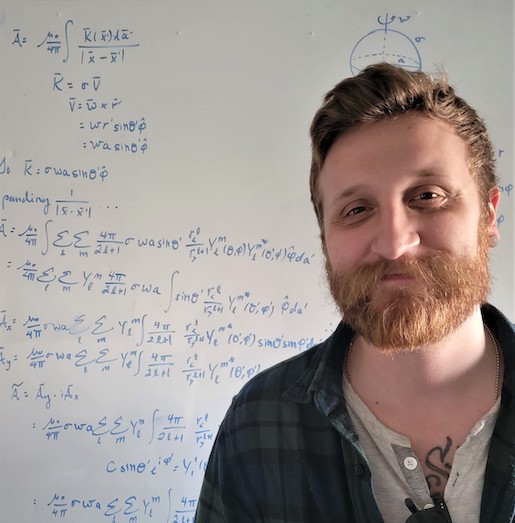
“Something that I didn’t expect was how quickly me and the other first-year (students) built a relationship and became comfortable around each other”.
“Something that I didn’t expect was how quickly me and the other first-year (students) built a relationship and became comfortable around each other,” expressed Dillon Anderson, a Ph.D. student from the Physics Department at MSU. Among those lines, he said that his first-year classmates have helped each other to relief stress and anxiety, which “will be a necessity for most of us to complete the next five or so years.”
During his undergraduate program and over some summers, Dillon was able to participate in research activities as a way to start his way into a Ph.D. program. Therefore, he believes this is a good start for anyone interested in going to Graduate School. “The research I did as an undergraduate though was in a different field of study than what I'm going into now (Optics vs Plasma), but I prepared for this by doing computational and math projects directed towards plasma physics,” mentioned.
Anderson states he hopes his creative-geared mind will guide him to find solutions for research questions he encounters on his graduate journey. Besides, Dillon learned to appreciate and support the physics education program. “My quantum mechanics professor received his PhD in physics education, and it may have been the best physics class I've taken, even to this day,” he explained.
Dillon remembers some of the aspects that made him feel welcome and appreciated, including how faculty members call first-year students by their names, making them feel recognized. “Also, the upper year students, as well as the other first years occasionally checking in and just being there when needed has also helped a lot!” he pointed out.
Besides being a Ph.D. student, Dillon also is a tutor for the learning center and enjoys helping other students succeed in their classes.
Regarding some of his best suggestions for incoming graduate students, Dillon highlighted the community building element, which was crucial for him and his fellow students. Furthermore, he affirmed that it is better to reach out to peers early so that they start strong and have more time to develop relationships.
“It is not a guarantee when entering a program that the department as a whole has much of a community, or that others are looking for a sense of community as well (ask many graduate students in many other stem fields, i.e., computer science / mathematics). Having others to work through problems with, bounce ideas off, and just relax with is a necessity,” he finalized.
Ernesto Ortiz
Ph.D. Computer Science
“Probably the most important skill you can bring is knowing how to collaborate with others. Most graduate students here are skilled collaborators, which makes the work easier for everybody and greatly increases the chances of success.”
For Ernesto, one of the most important things that positively influences graduate students’ success on their programs is to come with a solid foundation of knowledge in the field of study, but also with robust studying habits. “Probably the most important skill you can bring is knowing how to collaborate with others. Most graduate students here are skilled collaborators, which makes the work easier for everybody and greatly increases the chances of success.”
Ernesto Ortiz is a Puerto Rican Ph.D. student in the Computer Science program and a Research Assistant in the Software Engineering and Cybersecurity Laboratory. He commented that one unexpected challenge has been to effectively communicate his research verbally, thus he encourages prospective students to be aware of it and learn how to master it.
“You are constantly having to explain your work to other people, frequently in high stakes settings. Doing this correctly takes a conscious effort because you are constantly advancing your work, and you might have explained your work two months ago, but after two additional months of development, the shape of the project has evolved, and the correct focus may have evolved, and you still need to be able to contextualize it in the big picture of what you are trying to do,” Ortiz pointed out.
Ernesto also emphasized the always-present contact with research, from the lectures to research papers graduate students read or write. “Class projects require doing research. So, you're not only reading papers and doing research to develop your knowledge of your field and your area of interest, but you're also understanding research from different points of view and developing rigor from frequent exposure.”
Overall, Ortiz affirms he is happy with his decision to join MSU. “The people are friendly, interesting, helpful, and adventurous. There are plenty of organized groups, of places to go, of people to meet, and opportunities to learn.” Furthermore, he remarked that one of his favorite places to study by himself or with a group is the MSU Library and that he goes to the gym very often. “We have a new one coming soon, and everyone is very excited about it,” expressed.
A piece of advice he offered to new graduate students interested in doing research was, “Identify researchers whose work you like. Try to learn as much as possible from everything those researchers have published. Once you develop independent ideas about the work of a particular researcher, you will also be in a position where you could try to contact those researchers and get their input and suggestions on possible new approaches to problems and ideas in the field. By learning more, you could open collaboration opportunities, and in general create avenues that regularly bring in feedback and new information.”
Paytyn Wilson
Adult & Higher Education, master’s program
“I was so lucky to have excellent mentors, friends and resources who helped me at least walk down a path. I still feel like it’s a moving target, but MSU has so many resources available to students, and I have had so many experiences that have connected me to my values and helped me better understand the type of professional I want to be.”
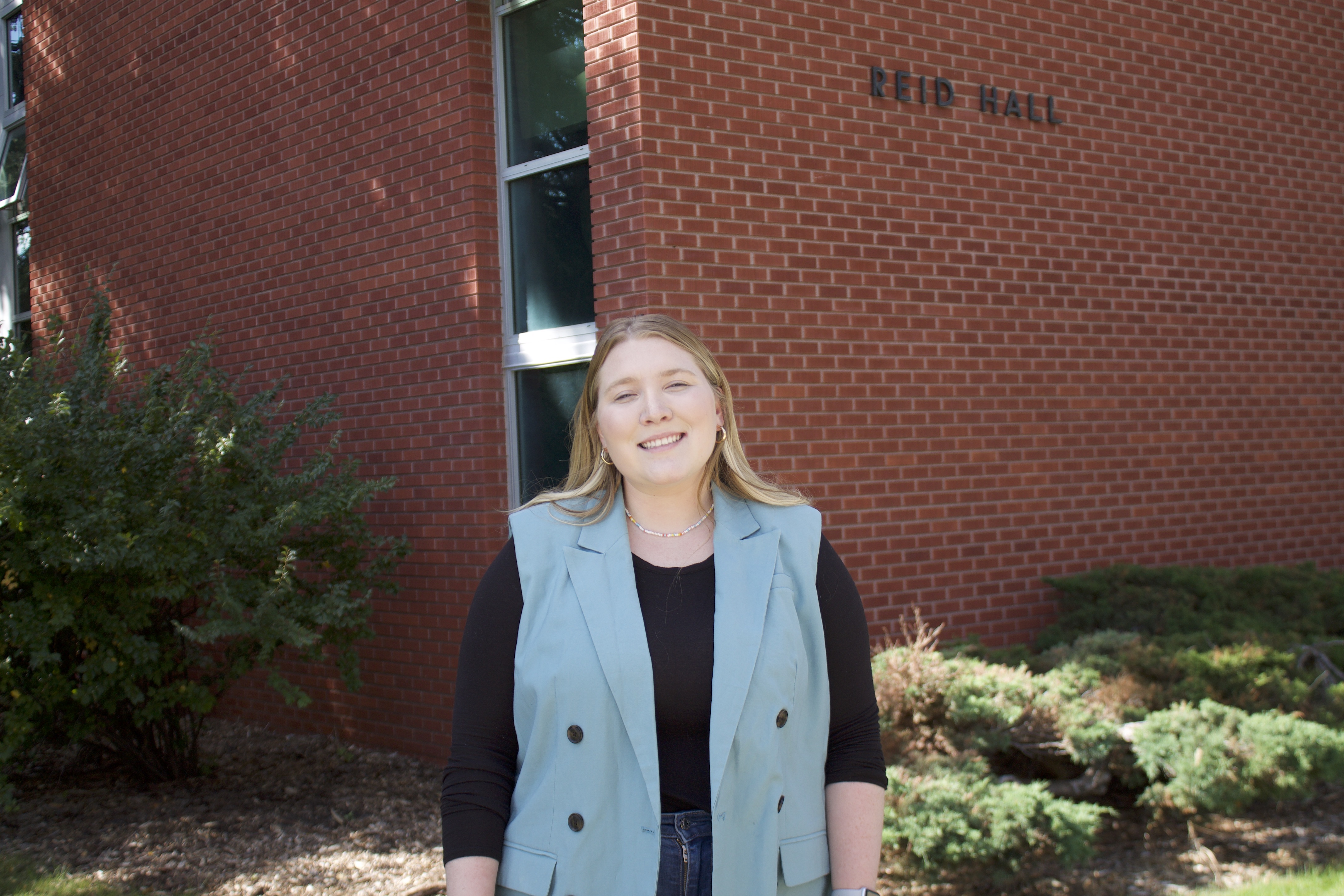
While studying her undergraduate program in Agricultural Education, Paytyn Wilson, discovered she wanted to go beyond the high school settings and look for a broader picture. “I was so lucky to have excellent mentors, friends and resources who helped me at least walk down a path. I still feel like it’s a moving target, but MSU has so many resources available to students, and I have had so many experiences that have connected me to my values and helped me better understand the type of professional I want to be,” she mentioned.
That’s why Wilson has started her first semester as a graduate student at MSU. She affirms she was considering moving out of state after her graduation here; nonetheless, she stayed after assessing the uniqueness and connectedness of the Adult & Higher Education program.
Paytyn observed that, “while growing exponentially, MSU is still a school where your professors will know you by name and will take a genuine interest in your journey. Staff and faculty are the same way. The people here care about you, as an individual, they want to see you succeed.” Besides, she had a rich experience with engagement and community because of the roles she previously undertook in ASMSU student government and other leadership positions.
Regarding the ways in which MSU makes her feel welcome and appreciated, Paytyn mentioned that the Graduate School “does an excellent job at communication and event planning to meet student needs. Leading up to the school year, I felt like the events and opportunities to engage were communicated in a very clear way, for the first time preparing for school I didn’t feel overwhelmed! Even though I have been at MSU for a long time, I am still being introduced to new scholarships, or resources to support me.”
Wilson emphasized some of the resources available on campus, from the Bounty of the Bridgers Food Pantry, to writing and math centers that provide academic support, and the College of Business’ support with tax filling. However, she believes that the greatest resource is the community at MSU. “Every professional I have interacted with throughout my time here has been genuinely invested in my experience and have offered me so much help and support.”
She currently serves as a Graduate Assistant in the Diversity & Inclusion Student Commons (DISC), and remarks that the center is an important resource for community building with peers and “space that we hope empowers students to succeed academically, socially, and emotionally. We aim to contribute to a more inclusive campus culture, while celebrating unique identities and perspectives. Come see me there!”
Wellbeing and overall support to students is key for their development, and Paytyn considers this is seen through the Graduate Student Wellness Initiative. “This initiative has support for basic needs, physical & mental wellbeing, community & mentoring, and career fulfillment. I am expecting to gain such a well-rounded perspective on my graduate experience and use this support, community, and knowledge to have a productive and impactful career in higher education,” explained.
Her final recommendation for new graduate students is to go talk to people and ask questions. “I am going to let you in on a little secret - every single person you will meet has been there, no one has it all figured out! Talk to students in the program, advisors, people doing research or teaching classes, just get their perspectives and use it to inform your decisions.”
Madisan Chavez
Masters of Science Land Resource and Environmental Science
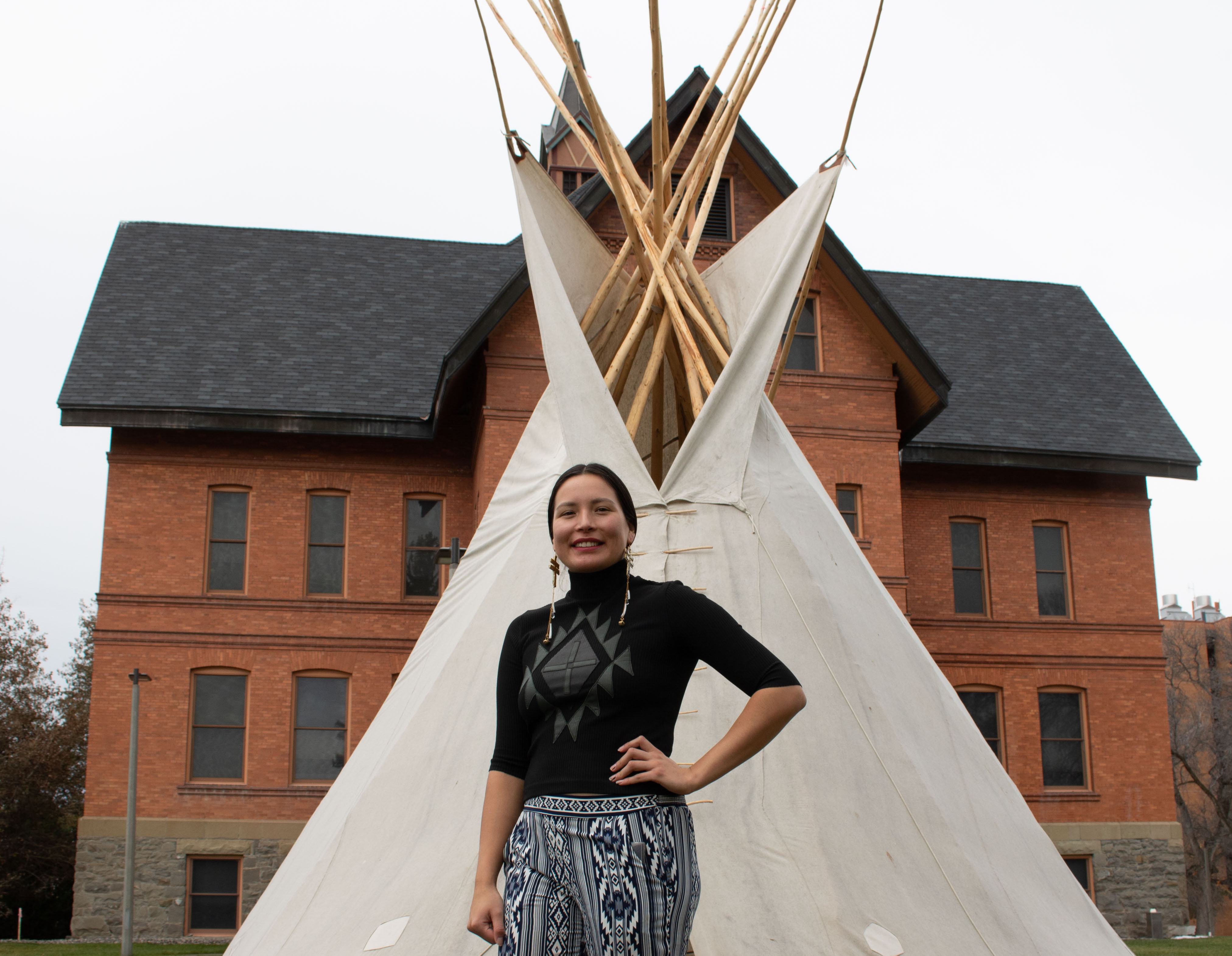
“My background contributes to my graduate program’s success because of my ancestors and the things they went through. They were stripped of their culture and identity; with my education I feel like I am making them proud.”
For some students, graduate school can be seen just as an extension of their undergraduate experience. For Madisan Chavez, a member of the Crow tribe and am Northern Cheyenne, Ogalala Lakota Sioux and Mexican, this wasn’t expected but ended up being true. “Something I did not expect to learn in my graduate program is the similarity of undergraduate school and how many connections you can make.”
Madisan also mentions the importance of having a support network during every graduate student journey, “it is possible to get your master’s if you have the right people in your corner.” Also, as part of her background, she emphasized how it plays an essential role in her academic success.
“My background contributes to my graduate program’s success because of my ancestors and the things they went through. They were stripped of their culture and identity; with my education I feel like I am making them proud.”
Chavez also affirms that one aspect of her professors’ methodology that most relates to her is their knowledge on her reservation. Referring to one faculty in particular, Madisan expressed that, “she worked with my community on the Crow reservation, so she knows the environmental issues that we need help with. She is knowledgeable about my reservation and is a big help in getting funding for my master’s program.”
She also explained how the American Indian Hall has been one of the MSU’s attributes that makes her feel welcome and appreciated, along with Leon Johnson Hall, where she takes most of her classes. “The people in both those institutions are very helpful in making my transition into my master’s program that much better. I’m thankful for all the resources that MSU has to offer,” Madisan mentioned.
Madisan provided some suggestions for new graduate students, like doing things out of their comfort zone, and making friends in their classes. “Some friends you make can last a lifetime,” she highlighted.
Chidimma Ifeh
Ph.D. Individual Interdisciplinary (Sustainable Food Systems, Statistics, and Computer Science)
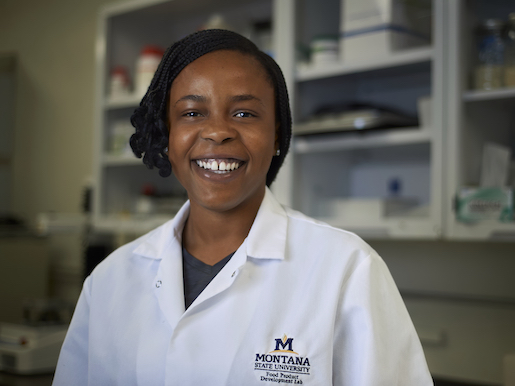
“Despite their struggles, these farmers would always have patience for the crops to grow, knowing that harvest would be plentiful. Currently, the Food Product Development lab at MSU works with farmers in West African countries, and my experience working in the lab has been crucial for my growth and success.”
Having diverse knowledge from working with farmers in Nigeria along with the knowledge she acquired from her food science and technology bachelor’s degree, made it easier for Chidimma Ifeh to decide on starting her journey in the Graduate School. Originally from Anambra, Nigeria, the now Ph.D. student in the Individual Interdisciplinary Program, joined Montana State University to earn a master’s degree in Sustainable Food Systems.
“I acquired a BSc in food science and Technology in Nigeria. After college, I got a certification in Software Engineering. I started as a master's student in Sustainable Food Systems at MSU before transitioning into a PhD program in the Individual Interdisciplinary Program (Sustainable Food Systems, Statistics, and Computer Science),” she stated.
Among the most surprising elements during her graduate studies, Chidimma mentioned the grant writing boot camp was a very insightful experience as she was not expecting to explore that path. “It was life-changing,” she commented. Another essential element for Ifeh’s academic development has been her relationship with the faculty. She defined their methodology as being “Real-life applicational,” with cases and examples that have helped her connect better with her program of study.
“The mentorship from faculty and staff here at MSU is excellent. I have been given opportunities to explore and present my research in several aspects. Most importantly, MSU's warm and welcoming environment for students is second to none,” Chidimma affirmed.
Regarding her background strengths, Chidimma Ifeh commented that her experience from her work in Nigeria taught her patience and perseverance. “Despite their struggles, these farmers would always have patience for the crops to grow, knowing that harvest would be plentiful. Currently, the Food Product Development lab at MSU works with farmers in West African countries, and my experience working in the lab has been crucial for my growth and success.”
She shared her insights about different resources on campus, including the Food Product Development Lab, and the African Students Association. Besides, she has participated in programs organized by the College of Education, Health and Human Development, the Office of International Programs, the Office of Research and Development, and the Graduate School. “The health care sector, the MSU Pollution Program, the grant writing boot camp, the graduate student body. They all collectively contribute to the rich and dynamic academic environment at the institution.”
Her more important recommendation for potential MSU grad students is to ensure meaningful discussions with your advisors “about your strengths and weaknesses and allow yourself to learn from the mentorship you will receive from your advisor and professors. Find a support system through a club or organization and join and make good friends who will always be there to help you in challenging situations.”
Eqi Luo
Ph.D. Earth Sciences
“My department’s collaborative work has built a supportive community, while the global viewpoints of my professors have expanded my understanding of environmental challenges. Additionally, the focus on open science has emphasized transparency and accessibility in research, enriching my learning experience and fostering a deeper engagement with my field.”
Eqi Luo, a first-year PhD. student at the Earth Science Department, told us about his very diverse international background and current journey. Original from southern China, he obtained a bachelor’s degree in Land Resource Management. After that, his pursue of higher education led him to the Netherlands, where he studied and worked for four years while he strived for getting his master’s degree in Geo-information science.
“Before joining MSU in 2023, I have been studying and working in the Netherlands for 4 years, but one day I found a grad student recruitment post from Dr. Cascade Tuholske. I considered it as such a great opportunity, so I reached out, applied and here we are already in the second semester!” explained Luo.
Although Eqi found it crucial to achieve a good work-life balance, he has learned ways to keep a stable state of mind and well-being. “Heading into my PhD, I was all geared up for diving deep into Earth Science, thinking the main challenge would be keeping up with my research. But soon I realized that the time and demands of a PhD. program also require you to develop strong personal management skills, as well as a supportive community around you.”
Eqi’s research will aim to understand the impact urbanization and climate-related risks have on the “most deprived population in low and middle-income countries,” and this focus is equipped with his international background.
“I guess having a diverse background has been key to my graduate program success. With experiences in China, the Netherlands, and field work in Africa (Egypt, Kenya, Uganda), I've developed a rich international perspective - critical for researching urbanization and climate change. This global outlook enables me to approach complex issues from multiple viewpoints, which is crucial when examining the impacts on various communities worldwide.”
When addressing his professors in the Earth Science department, Eqi emphasized, “My department’s collaborative work has built a supportive community, while the global viewpoints of my professors have expanded my understanding of environmental challenges. Additionally, the focus on open science has emphasized transparency and accessibility in research, enriching my learning experience and fostering a deeper engagement with my field,” he affirmed.
Regarding the services and programs he has engaged the most with, Eqi highlighted the Counseling and Psychological Services (CPS), as well as student organizations such as the Asian Student Interracial Association (A.S.I.A.) and the Chinese Culture Club. “CPS provided me with valuable support during this transition, helping me to navigate my feelings, adjust to my new environment, and gradually build a sense of community at MSU. Also, I’d like to acknowledge, although still relatively small, the presence of cultural, diversity-related associations indeed offers a sense of home and identity for minority students on campus, promoting diversity and inclusion.”
Eqi’s advice for prospective students is to commit to a self-discovery journey with your field of interest while enjoying the process. “Graduate school can be intense, so finding ways to manage your time effectively while ensuring you have moments of relaxation and fun is key to not only your academic success but your overall well-being,” he stressed.
Johnathan Reyes de Merkle
Ph.D. Ecology and Environmental Sciences

“Even as a graduate student, there are a lot of student organizations you could join as only a member, or officer, or advisor.” He added, “Finding community for support to counterbalance [your schoolwork] because it will make the experience more enjoyable.”
Johnathan Reyes de Merkle, a Ph.D. student in the Ecology Department, was in Zambia serving as a Peace Corps volunteer after completing his bachelor’s program. This experience aligned with his research background in zoology, biology, ecology, and others, and he also had the opportunity to volunteer with different non-profits working on conservation. He decided to focus on the Zambian carnivore program.
“They had an education program where we worked with an elementary school to teach them about science and conservation. After that, I just stayed out and kept researching and working with the organization. Eventually, I became a researcher and a manager,” shared Johnathan, who spent 10 years devoting his efforts and experience in Zambia.
Fortunately, one of the nonprofit organizations he worked for had a direct connection with Montana State University. “My advisor, Dr. Scott Creel, has been working and helping set some of the research directives. My boss with the nonprofit is affiliated with MSU as well. He had got his Ph.D. here since he is from Montana, Bozeman.”
His research on African wild dogs, an endangered species, and the knowledge gathered and work field with MSU-related professionals made him decide on pursuing a graduate program at MSU, where Johnathan affirms, the Ecology department has received him with welcoming arms.
“I feel very fortunate in the Ecology Department and its different professors that have brought new perspectives and ideas.” Reyes de Merkle mentioned helpful courses, like a communication class, which aimed to improve students’ public speaking skills and a meta-analysis class which goal was to collaboratively answer specific research questions, to name a few.
Johnathan is a Teaching Assistant at the Ecology Department, and he recalled some bonding activities the students and faculty put together to welcome new graduate students, like the famous rubber duck race. However, he is also involved in the seminar community, a student organization that brings in speakers from nearby states.
“The speakers talk about their own research experience, how they went from Graduate School to post-doc, to becoming a professor or working for a nonprofit or for a government agency. That's been I think a good sense of community,” he pointed out.
His advice for prospective students is to get to know not only your future advisor, but the lab you will join (or group/workplace in case you are not doing research). “The relationship between your advisor and your yourself as a graduate student is a very important one and very long term.”
Johnathan also emphasized the community-building element by stating that “Even as a graduate student, there are a lot of student organizations you could join as only a member, or officer, or advisor.” He added, “Finding community for support to counterbalance [your schoolwork] because it will make the experience more enjoyable.”
Erica Venkatesulu
Ph.D. Electrical and Computer Engineering
“In my research, my advisor supports my research progress and learning through one-on-one meetings, encouraging collaboration between members of the research group, and sometimes giving me the space to try what I think is best, even if it means I fail a few times before I figure it out.”
Erica Venkatesulu, a Ph.D. student in the electrical and computer engineering program, not only focuses her research on advancing a tool for measuring the composition of clouds, but she also serves as president of the Optics and Photonics Society at Montana State University.
“This is a student organization that brings together undergraduate and graduate students who are passionate about optics and photonics. The support we have received from the Office of Student Engagement and the Graduate School has helped many of our professional development and community building activities, which have been a valuable part of my grad school experience.”
Erica received a MS in Optics and Photonics in 2022 and works in the Optical Remote Sensor Laboratory. She commented on some learning experiences she didn’t expect to get before joining her program. “I wasn’t expecting to learn so much about giving presentations! I have given presentations in classes, at conferences, and to people in industry. I have learned a lot through feedback and watching others give successful presentations, and I have grown to enjoy presenting much more than I used to!”
Her undergraduate background played an important role in her academic career, as she stated that her research experiences during her bachelor’s degree in electrical engineering gave her “the confidence to approach problems where I have no idea where to start, taught me how to navigate working in teams (including telling more experienced team members what I need from them and mentoring less experienced team members), and made me comfortable admitting when I am totally confused.”
For Erica, the hands-on experiences she encounters have been instrumental in her learning journey. She shared that she finds it more helpful when her professors asked the class to design, simulate or build multiple optical systems. Venkatesulu also talked about her advisor,
“In my research, my advisor supports my research progress and learning through one-on-one meetings, encouraging collaboration between members of the research group, and sometimes giving me the space to try what I think is best, even if it means I fail a few times before I figure it out.”
One evidence for her to feel welcomed at MSU is that people approached her when she got highlighted by the MSU News Services and students and faculty (some were not her professors), and community members congratulated her.
However, Erica also enlisted some resources that have helped her so far. “The support we have received from the Office of Student Engagement and the Graduate School has supported many of our professional development and community building activities, which have been a valuable part of my grad school experience,” Erica expressed.
Besides her research and leadership role in the Optics and Photonics Society, Erica is a Graduate Student Ambassador for the Norm Asbjornson College of Engineering. They organize seminars and social events for graduate students to mingle. “I have also been involved at Resurrection University Parish over my years in grad school. Resurrection is a Catholic Church near campus which has an active young adult group.”
When asked for a recommendation for new graduate students, Erica emphasized to include your advisor in your plans. “Plan early and include your advisor in your plans! You can always change the plan, and sometimes it will change itself. However, it’s easier to decide earlier what classes you are going to take (some are only offered every other year), if you want to get teaching experience even if you have funding for a research assistant position, or if you want to apply for a fellowship,” she concluded.
Enkhchimeg Sharav
Ph.D. Curriculum and Instruction
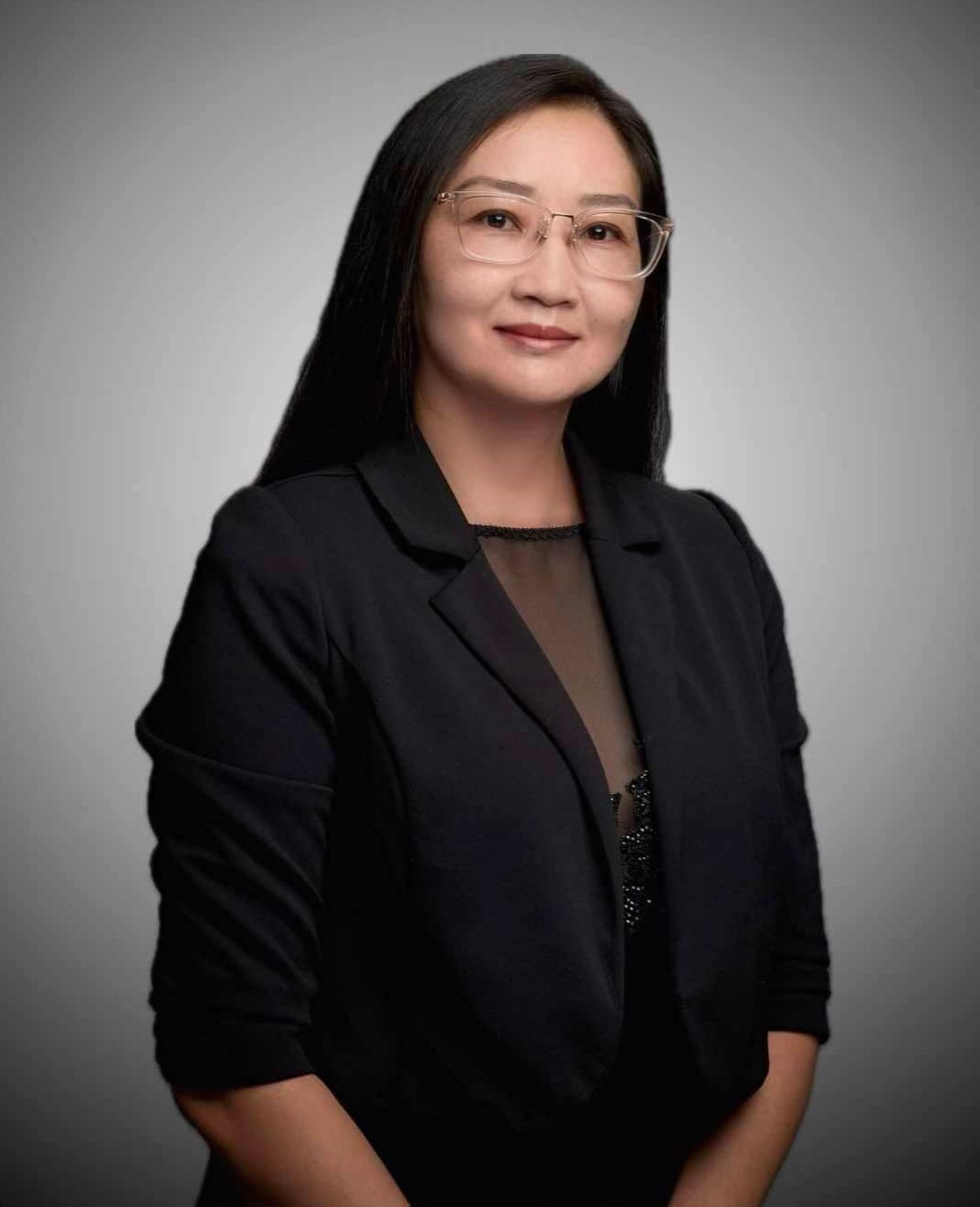
“MSU professors make me feel more connected to my program through their mentorship and active involvement in student development. They don’t just teach; they nurture relationships and support students in achieving their goals. By involving students in meaningful work and encouraging them to pursue their passions and research, they create an environment where I feel motivated to succeed and engage in my academic pursuits and professional goals.”
“I am grateful to be part of a welcoming and supportive community at MSU that encourages both personal and professional growth.” Enkhchimeg Sharav, a PhD in Curriculum and Instruction student shares her experience in her graduate program. She defines herself as a global education enthusiast, and a researcher with a curious mind, which is evident when seeing all her academic and professional accomplishments.
With a dual bachelor’s degrees in education and business management and a master's degree in Curriculum and Instruction, Enkhchimeg has a wide educational background as a mentor, lead teacher and project initiator. “My exposure to different cultures and languages in Mongolia, Japan, Russia and China has broadened my approach to education, giving me a global perspective that I bring to my academic work,” she added.
During her time at Montana State University, Sharav has boosted her relationships with faculty and peers while developing leadership, management, and interpersonal skills through various programs.
“MSU professors make me feel more connected to my program through their mentorship and active involvement in student development. They don’t just teach; they nurture relationships and support students in achieving their goals. By involving students in meaningful work and encouraging them to pursue their passions and research, they create an environment where I feel motivated to succeed and engage in my academic pursuits and professional goals,” Enkhchimeg explained.
Sharav has actively assumed leadership roles. Some examples of her hard work include working on federal grant projects such as serving as an Instructional Coach and Research Assistant for the Montana Teachers of English Language Learners (MontTELLs) project in the Center for Bilingual and Multicultural Education, Fulbright Teaching Excellence and Achievement (FTEA) program, and Middle East Partnership Initiative (MEPI) program in the Office of International Programs.
She now serves a president of the United Nations Association of the USA, Montana State Chapter, where she leads chapter initiatives related to educational and advocacy campaigns towards the Sustainable Development Goals. Moreover, she has established a non-profit organization based on the skillsets and knowledge acquired through MSU’s programs such as the Blackstone LaunchPad, ASMSU Legal Services, the Graduate School’s Leadership Academy, workshops hosted by the Center for Faculty Excellence and grant opportunities.
“One of the achievements during my graduate program here at MSU is establishing my nonprofit organization, the International Education Networking Initiative (IENI). The organization aims to benefit students and educators from diverse backgrounds, enhancing their personal and professional development.”
Enkhchimeg expressed that she feels a sense of community on campus. “The various programs, services, and opportunities available throughout the campus contribute to this environment, making MSU a place where I feel valued and connected.” Therefore, she recommends prospective students to choose a research topic that strongly aligns with their passions, to be curious and to stay connected to it and their mentors and advisors. “You will make your graduate studies more rewarding,” she stated.
Jasmine Smith
Master in Curriculum and Instruction
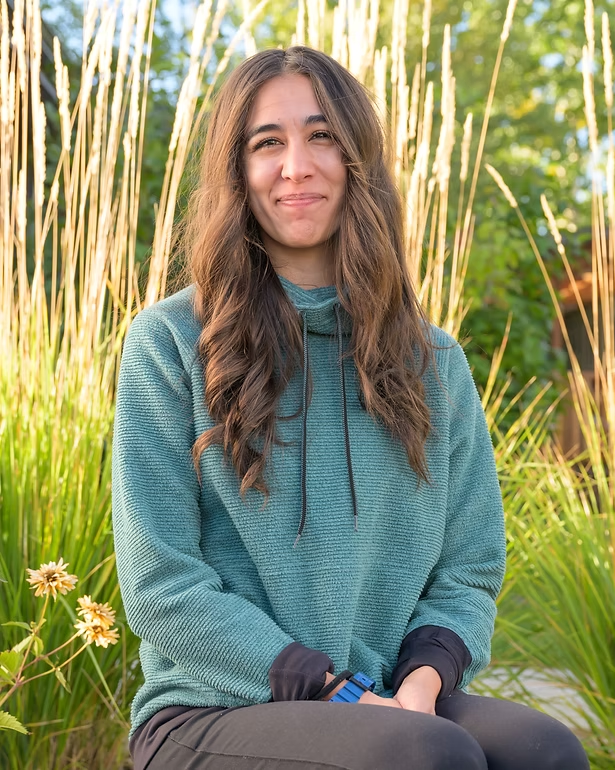
“My background as a former teacher has been a huge asset throughout this journey. Having spent years in the classroom, I often find myself making connections between my past experiences and the concepts we discuss in class. I like seeing the theories come to life, and it’s made the coursework feel more relevant and impactful.”
Jasmine Smith, originally from Cincinnati, Ohio, talked about her transition from being a classroom teacher to a graduate student at MSU. “[Cincinnati] is a place that shaped my love for education and lifelong learning. That transition felt like a natural next step in my career path,” she recalls. As a way to get herself closer to opportunities within the education field, she joined the curriculum and instruction master’s program.
“My background as a former teacher has been a huge asset throughout this journey. Having spent years in the classroom, I often find myself making connections between my past experiences and the concepts we discuss in class. I like seeing the theories come to life, and it’s made the coursework feel more relevant and impactful,” Jasmine mentions.
Smith affirms that even though the online classes added some hesitation on her about potential disconnection, the truth is that the professors’ methodology and class structure proved the opposite. Jasmine affirms that the discussions with other educations “with their own wealth of experience adds richness to our conversations” and made her felt part of a larger learning community.
She has also made use of a wide range of student resources, such as the Career, Internship & Student Employment Services. As Jasmine states, “Preparing for the job market can be daunting, but they’ve made it manageable and even exciting. They offer a wealth of knowledge around resumes, LinkedIn, and job hunting.”
Jasmine Smith was gladly surprised about the number of resources available to students. Some examples are career counseling, workshops about the job market and more. Another great asset Jasmine considers important to highlight is the Writing Center, because “it offers guidance on assignments and has helped me refine my academic writing skills. These resources have not only supported me academically but also boosted my confidence.”
Her advice for new graduate students is to “take full advantage of everything MSU has to offer. Don’t hesitate to reach out for help or participate in programs that interest you. Grad school is a busy time, but the connections and skills you build here are worth the effort.”
Jackson Strand
Ph.D. Ecology & Environmental Science
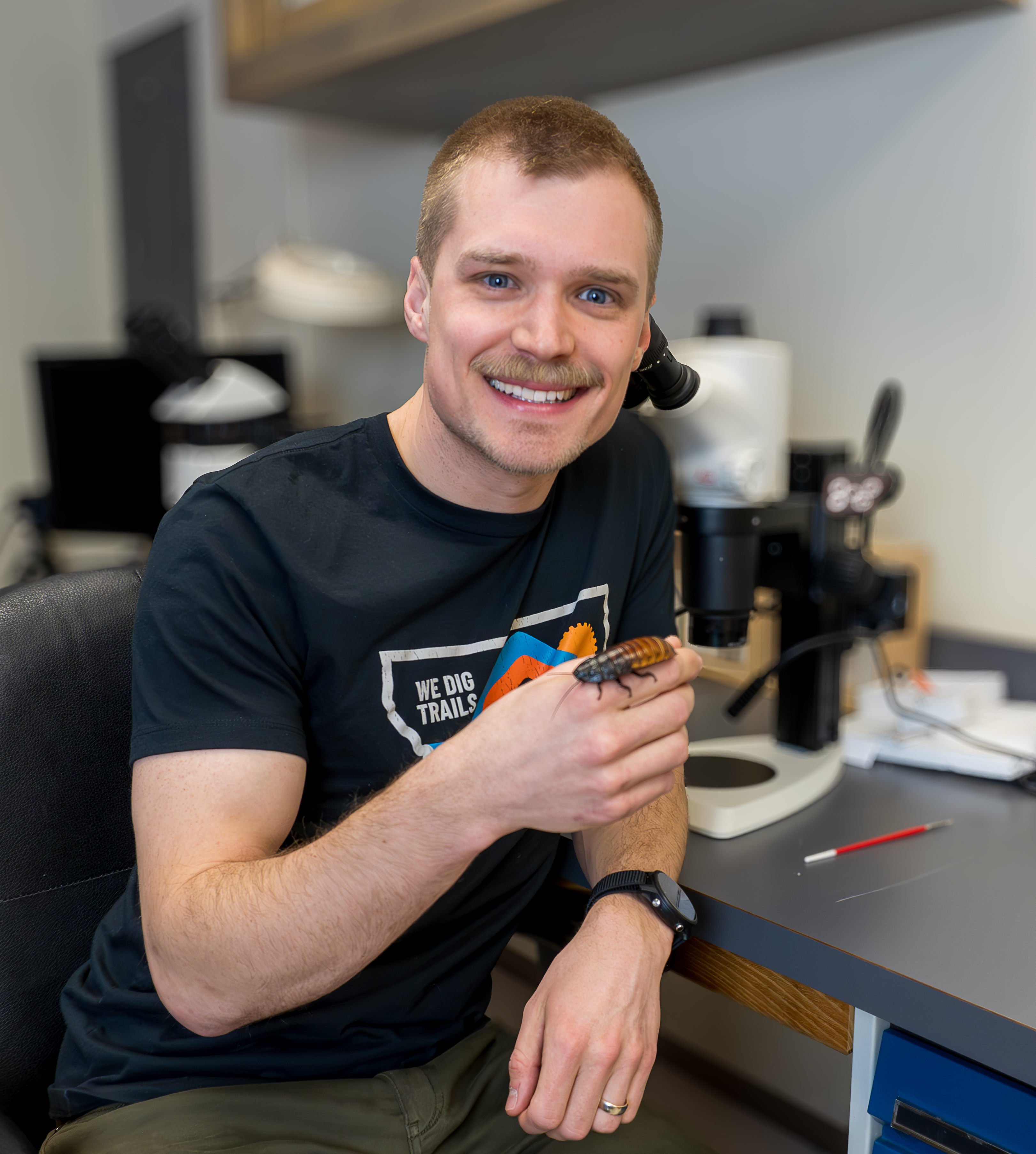
“Rather than providing solutions outright, my advisor encouraged me to think through challenges on my own, giving me the space to explore different approaches and learn through trial and error. This approach not only allowed me to develop problem-solving skills but also helped me build resilience by viewing failure as an essential and beneficial part of the scientific process.”
Graduate School requires a student to go beyond their own expectations and to trust their knowledge, the process and ask for feedback and collaboration. This is what Jackson Strand, Ph.D. student at the Ecology and Environmental Sciences at MSU shared.
“I didn’t expect to learn just how much uncertainty and ambiguity are a natural part of research and the scientific process. Sometimes experiments fail, data doesn’t make sense, or a project pivots entirely. Learning to embrace that uncertainty as part of the process and adapt has been a valuable life skill. Additionally, I didn’t realize how crucial professional relationships are to advancing in science. Whether it’s finding collaborators or getting feedback on research, connecting with others has become an essential part of my work.”
Jackson worked for 3M in Minnesota, an American multinational conglomerate company operating in the fields of industry, worker safety, and consumer goods. Having different skills in Microsoft Excel, SQL, and SAP, prepared Strand to start a graduate program. “It strengthened my data management skills and gave me confidence in working with large, complex datasets. During that time, I also taught myself how to navigate and utilize these systems more effectively, which not only provided me with a strong base of technical skills, but helped develop problem-solving abilities and critical thinking skills.”
Jackson also expressed the type of methodology his professors had applied, and emphasized that his program and advisor encourage independence while portraying a diligent encouragement and guidance.
“Rather than providing solutions outright, my advisor encouraged me to think through challenges on my own, giving me the space to explore different approaches and learn through trial and error. This approach not only allowed me to develop problem-solving skills but also helped me build resilience by viewing failure as an essential and beneficial part of the scientific process.” He also affirmed that his advisor would make sure he stays on track. “There was a balance between offering support and allowing me the autonomy to take ownership of my project. This approach made me feel respected as a researcher and gave me a greater sense of investment in my work.”
Strand highlighted the sense of community at MSU, more specifically, in the Land Resources and Environmental Sciences (LRES) department, where he has built many connections and established meaningful relationships with students and faculty. Jackson has also served as a student leader, by being Treasurer and other leadership roles at the LRES Graduate Student Organization (GSO).
“This experience has been incredibly rewarding, as it has allowed me to work closely with my peers to foster a sense of community and ensure that graduate student concerns are heard and addressed. Organizations like the GSO play a vital role in bridging the gap between students and faculty, creating a strong line of communication within the department. They also provide opportunities for professional development, networking, and social connections that are invaluable during graduate school.”
As he looks back at his experience as an undergraduate at the University of Minnesota and reflects on all the great opportunities and accomplishments achieved here at MSU, Jackson’s advice for incoming graduate students is to get involved and attend as many department activities and events as possible.
“Building a strong social network has countless benefits, from brainstorming research ideas and receiving advice to forming lasting friendships. Engaging with faculty and peers outside of your immediate lab or committee helps you develop a broader perspective and appreciate the innovative work happening across the department and university. It’s easy to get narrowly focused on your own research, but stepping back to connect with the larger academic community can provide valuable perspective and purpose.”
Celeste Kenworthy
M.S. in Science Education
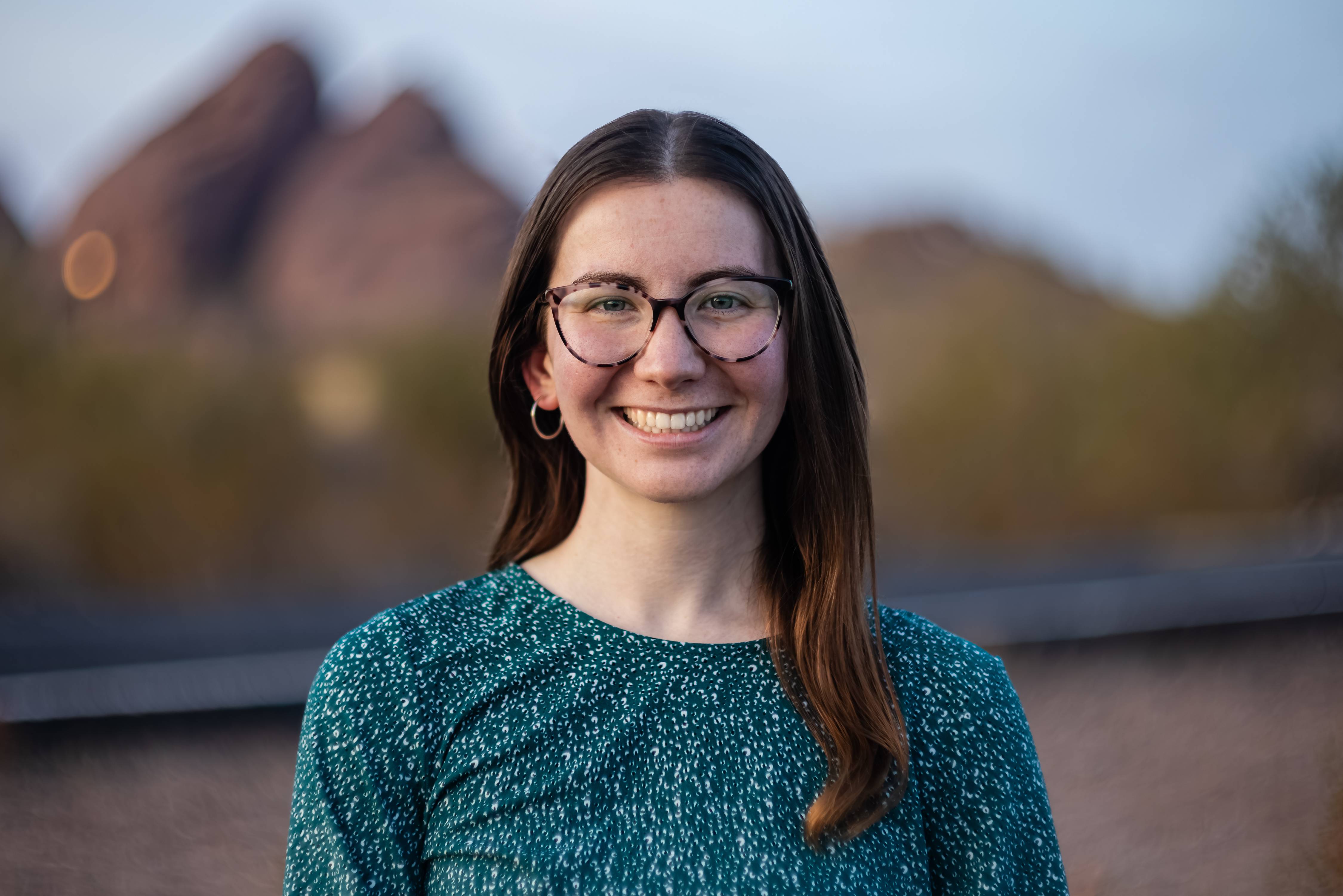
“I expected to learn a lot about science and education through MSSE, but I was surprised by the amount of unique and engaging opportunities available. One of the best features of the MSSE is the in-person field courses, in my opinion. For the past two summers, I have come up to Bozeman to take Dinosaur Paleontology I and II.”
Celeste Kenworthy, originally from Nebraska, lives in Phoenix, Arizona and is one of our graduate students in the Master of Science in Science Education program and the Graduate Certificate in Teaching Earth Science. She explained how her multiple experiences and background shaped and better informed her decision on joining graduate school. “I completed my Bachelor of Science in geology and psychology at the University of Nebraska – Lincoln. The science coursework for my geology degree, including physics, chemistry, and biology, as well as geology, prepared me well for the science content of the Master of Science in Science Education.”
This passion for science started since Celeste was in middle school and high school. She recalls participating in Science Olympiad, Awesome Aquifers, Water Quality and Hydrogeology. Besides, she has worked in other education-related roles, including as an after-school club leader at a local elementary school, an environmental science communication intern at the University of Nebraska State Museum, and an engagement specialist at the Arizona Science Center. These roles, as well as my current job as an instructor III at the Phoenix Zoo, gave me relevant experience to draw on throughout my degree program,” Celeste affirmed.
Equipped with that experience, plus her experience with online coursework during her undergraduate degree program, she enrolled in a distance master’s program: the Master of Science in Science Education (MSSE). “I expected to learn a lot about science and education through MSSE, but I was surprised by the amount of unique and engaging opportunities available. One of the best features of the MSSE is the in-person field courses, in my opinion. For the past two summers, I have come up to Bozeman to take Dinosaur Paleontology I and II,” commented.
The MSSE program, according to Celeste, has exceeded her expectations and the support in fostering connections she has received from her professors has boosted her success. “They have accomplished this by providing discussion boards and group building activities during in-person courses. The professors in the MSSE program have also made assignments customizable to the students’ own locations and teaching situations.” The MSSE required action research project also leads students to build on key issues related to their practice areas.
One of the resources she has used the most during her programs at MSU is the writing center. “The ability to receive outside feedback on my capstone chapters whenever I need has been invaluable in keeping my writing clear and purposeful. I am glad this is a resource available to both on-campus and remote students.” Celeste also mentioned that the Adobe Creative Cloud and Microsoft Office licenses available for free to students have been very helpful. Furthermore, she also celebrated that the library services helped her find articles for her capstone research.
Drawn by her well-earned culture of collaboration and learning, she has also served as a mentor for new students in the MSSE program. “Along with my co-mentor, we hosted monthly Zoom meetings on relevant topics for first-year students and connected via Slack,” Kenworthy stated. Finally, she reflected on the value of starting a journey in graduate school. “Graduate School is an excellent time for personal and professional growth. It is also a natural transition time to consider what you value for your future career and personal life. There is no one set path after completing a graduate degree.”

